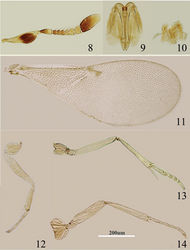Difference between revisions of "Metaphycus alberti"
m (Imported from ZooKeys) |
m (1 revision) |
(No difference)
| |
Latest revision as of 09:18, 5 April 2013
| Notice: | This page is derived from the original publication listed below, whose author(s) should always be credited. Further contributors may edit and improve the content of this page and, consequently, need to be credited as well (see page history). Any assessment of factual correctness requires a careful review of the original article as well as of subsequent contributions.
If you are uncertain whether your planned contribution is correct or not, we suggest that you use the associated discussion page instead of editing the page directly. This page should be cited as follows (rationale):
Citation formats to copy and paste
BibTeX: @article{Wang2013ZooKeys285, RIS/ Endnote: TY - JOUR Wikipedia/ Citizendium: <ref name="Wang2013ZooKeys285">{{Citation See also the citation download page at the journal. |
Ordo: Hymenoptera
Familia: Encyrtidae
Genus: Metaphycus
Name
Metaphycus alberti (Howard, 1898) – Wikispecies link – Pensoft Profile
- Aphycus alberti Howard, 1898: 247. Syntypes +>, Australia (New South Wales), USNM, examined (part).
- Metaphycus alberti (Howard); Compere 1957[1]: 222, 224.
- Metaphycus aurantiacus Annecke & Mynhardt 1981: 60–61. Synonymized with alberti by Noyes 2004[2]: 254.
Female
Body length, including ovipositor, 0.72–1.1 mm. Frontovertex pale orange; orange in ocellar area, pale orange between occipital margin and posterior ocelli; immaculate from occiput to base of mandible; occiput with a large dark brown area above foramen, rest white; antenna (Fig. 8) with radicle very pale brown; scape mostly pale yellow and with a dark brown mark in middle, dorsal margin pale yellow; pedicel dark brown in proximal half, otherwise white, F1–F3 brown, F4–F6 white, clava dark brown, becoming slightly paler towards apex, apex pale brown; neck of pronotum brown, posterior margin translucent white, lateral spots relatively small and faint, rest white; dorsum of thorax orange; sides and posterior margin of mesoscutum and axillae inconspicuously bordered brown; setae translucent yellow, silvery in most lights; tegula white with apex pale grey-brown; metanotum orange; mesopleuron pale yellow; prosternum and mesosternum pale yellow; legs (Figs 12–14) mainly pale yellow; fore wing (Fig. 11) hyaline and with linea calva interrupted, stigmal vein about 2.3? as long as marginal vein, venation yellow-brown; hind wing hyaline; propodeum medially orange, laterally dark brown, sides white; gaster mostly yellow, sometimes pale brown dorsally from cercal plates to near apex, ovipositor sheath yellow.
Head with polygonally reticulate sculpture and mesh size slightly less than that of one eye facet; ocelli forming an acute angle less than 35°; eye not quite reaching occipital margin, separated by much less than diameter of a facet; frontovertex parallel-sided; scrobes shallow and U-shaped; antenna with scape about 2.7–3.5? as long as broad; funicle with F1–F4 smallest, subequal and transverse, F5 a little larger, F6 largest and slightly wider than long; linear sensilla only on F5 and F6; clava 3-segmented, its apex more or less rounded but with a short slightly oblique truncation; mandible relatively broad with three subequal, apical teeth; palpal formula 2-2 (Fig. 10), notaular lines reaching about 0.4? across mesoscutum; fore wing venation and setae as in Fig. 11; ovipositor (Fig. 9) slightly exserted, about 5.2? as long as ovipositor sheath.
Relative measurements: HW 13, FV 3, FVL 7, POL 2, AOL 4, OOL 1, OCL 2, POD 1, AOD 1.5, EL 8, EW 6, MS 3.5, SL 7, SW 2, FWL 37, FWW 14, HWL 26, HWW 5, OL 10, GL 2, MT 11.
Male. Length 0.7 mm. Generally similar to female but for coloration, structure of clava and genitalia. Frontovertex with ocellar area dark brown; dorsum of thorax and gaster dark brown. Antenna similar to that of female but clava solid and relatively slender; aedeagus about half as long as mid tibia.
Hosts
Coccus hesperidum (Annecke & Mynhardt, 1981), Coccus elongates, Coccus longulus and Ceroplastes sp. (Hemiptera: Coccidae) (Noyes 2004[2]).
Distribution
China (Chongqing, Fujian, Guangdong, Sichuan, Zhejiang), Hawaii, USA (California), Costa Rica, South Africa, Swaziland, Australia.
Material examined
China: 5++, Zhejiang, Huangyan, 1964.VII.17, Coll. D. X. Liao (IZCAS); 1+, Zhejiang, Ningbo, 2012.VII.3, F. Wang (IZCAS); 3 ++, 1>, Sichuan, Chengdu, 1961.VII.10–13, Coll. D. X. Liao (IZCAS); 2+, Guangdong, Heyuan, 2009.XI.8, F. Yuan and Y. Z. Zhang (IZCAS); 1+, Fujian, Wuping (Liangye Mt.), 2008.XI.15, Coll. F. Yuan (IZCAS); 1+, Fujian, Fuzhou, 1998.X, M. Xu (IZCAS); 1+, Chongqing, Longxi, 1992.VII.15 (BMNH). South Africa: 1+, Zebediela, 1957–III, Coll. D. P. Annecke (BMNH).
Diagnosis
Antenna with radicle very pale brown; scape mostly pale yellow and with a dark brown mark in middle, dorsal margin pale yellow; legs mainly pale yellow, scape about 2.7–3.5? as long as broad, ovipositor slightly exserted, about 5.2? as long as ovipositor sheath.Metaphycus alberti is very similar to Metaphycus dispar in general coloration and habitus.The female of alberti can be identified reliably by the pale yellow dorsal margin of the scape (in dispar dorsal margin of the scape medially interrupted by dark brown mark), and the ovipositor about 5.2? as long as ovipositor sheath (in dispar ovipositor about 4.3? as long as ovipositor sheath).
Taxon Treatment
- Wang, Y; Li, C; Zhang, Y; 2013: A taxonomic study of Chinese species of the alberti group of Metaphycus (Hymenoptera, Encyrtidae) ZooKeys, 285: 53-88. doi
Other References
- ↑ Compere H (1957) Descriptions of species of Metaphycus recently introduced into California and some corrections. Bollettino del Laboratorio di Entomologia Agraria ‘Filippo Silvestri’, Portici 15: 221-230.
- ↑ 2.0 2.1 Noyes J (2004) Metaphycus and related genera, parasitoids of scale insects (Coccoidea) and whiteflies (Aleyrodidae). Encyrtidae of Costa Rica (Hymenoptera: Chalcidoidea). Memoirs of the American Entomological Institute 73 (2): 1-460.
Images
|
